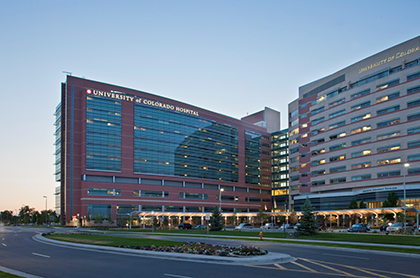Headache/Pain Medicine
Department of Neurology Clinical Practice
Thank you for your interest in the University of Colorado Headache/Pain Medicine Clinic.
Headache and Migraine
When patients are seen for headaches in doctors’ offices or in the Emergency room, the type of headache they are experiencing may be primary or secondary. The vast majority of headaches are primary headaches, meaning that no cause is identified. Migraine is the most common primary type of headache found in patients seen in outpatient clinics. Migraine is a disorder of the brain, with involvement of the blood vessels, nerves and other pain sensitive structures. It is uncertain what causes the cascade of events in the brain that eventually leads to migraine pain and associated symptoms. People who experience migraine headaches tend to have a lower threshold for activation of pain pathways compared to other individuals. These biological differences are often inherited. A specific (secondary) cause of headaches can be found and eliminated in only a small percentage of patients who suffer from headaches. It is a critical part of our job as neurologists to identify the secondary causes of head or face pains. To obtain the best outcomes for patients, our clinic brings together top expertise and the state-of-the art resources to appropriately treat underlying causes of patients’ symptoms.
New patient questionnaire
Accurate and comprehensive medical and headache histories, provided by patients, are a vital part of optimal care. Structured questionnaires can help patients think through their symptoms, identify headache causes and review various medications or treatments that have been tried previously or are currently in use, with or without effectiveness or relief. New patients visiting the Headache clinic at the University of Colorado Hospital for consultation are required to complete this questionnaire and bring a copy to their first appointment at our clinic.
Self assessment
A comprehensive online headache questionnaire that was developed specifically for patients by headache experts at Stanford University and the University of California Los Angeles can be found on the www.ProMyHealth.org website.
Headache management options
Once secondary causes are ruled out or treated and a patient is diagnosed with a primary headache or face pain (including migraine, cluster headache, tension-type headache, hypnic headache, cranial neuralgia), we work with him/her to formulate a comprehensive management plan that is specific to each patient. Our clinic offers careful assistance with a wide range of headache management approaches. Options include non-pharmacologic interventions (e.g., triggers management, relaxation, exercise, sleep, diet recommendations) and pharmacologic therapies (e.g., preventive and abortive medications - avoid overuse!). Our providers are skilled in a variety of procedures that can bring relief: Botox injections for chronic migraine, pain relieving nerve blocks, sphenopalatine ganglion blocks, and trigger point injections. Whenever appropriate, referrals can be made to the Outpatient Infusion Center, Pain Clinic, Integrative Medicine, Psychology, Physical Therapy and other specialties.
Goals of care
We encourage those that suffer from headaches to stay connected with his/her specific life goals that are defined by one’s own values and needs, and not by headache pain. We are strongly committed to an active partnership with each patient to achieve his/her goals by tailoring supportive interventions, such as those outlined above.
Learn more about your diagnosis at:
Behavioral resources and updates
5K run or walk to raise local and nationwide awareness for migraine and headache research
To make an appointment:
- Have your referring physician complete the referral intake form and FAX it and your medical records and insurance information to (720) 848-0015.
- Please allow 2 business days for processing of your paperwork. Then CALL (720) 848-2080 to schedule your appointment.
- Be sure to BRING discs with images of MRI/CT scans, as well as copies of lab results and pertinent medical records in person with you to your appointment.
We accept all PPO/HMO/POS plans. Please call your insurance carrier to verify benefits and coverage at University of Colorado Hospital.
